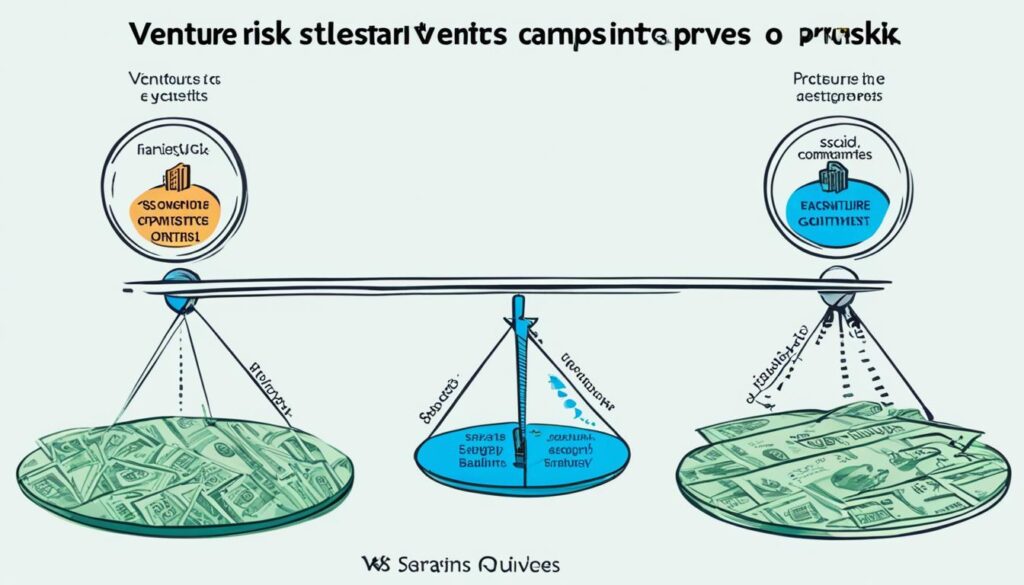In the dynamic world of startups, venture capital has long been the go-to funding source for ambitious entrepreneurs seeking to fuel their business’s growth. However, as the startup landscape continues to evolve, founders are increasingly exploring alternatives to venture capital that better align with their needs and long-term vision. From a desire to retain control over decision-making to a quest for non-dilutive financing options, the reasons for this shift are multifaceted.
This article will delve into the top startup funding options that are better than venture capital, uncovering the pros and cons of each alternative, including venture debt, revenue-based financing, structured equity products, mezzanine financing, private equity, and angel investors. By understanding these small business financing alternatives, founders can make informed decisions that strike the perfect balance between accessing the necessary capital and maintaining the control they need to drive their venture capital alternatives to success.
Key Takeaways
- Venture capital is no longer the only viable funding option for startups and small businesses.
- Founders are seeking alternatives that allow them to retain more control and avoid unrealistic growth expectations.
- Non-dilutive financing options, such as venture debt and revenue-based financing, are gaining popularity.
- Structured equity products and mezzanine financing can provide growth capital while limiting equity dilution.
- Private equity and angel investors can also serve as viable replacements for venture capital in certain situations.
Venture Capital vs Private Equity: Key Differences
When it comes to startup financing, understanding the distinctions between private equity and venture capital is crucial. These two investment approaches target different types of companies and offer unique benefits and drawbacks for founders seeking growth capital.
Private Equity: Investing in Mature Companies
Private equity firms typically focus on investing in more established, mature companies with the goal of improving operations and increasing profitability, often through a buyout. These firms usually make larger investments of $100 million or more and aim to take full control of the companies they invest in.
Venture Capital: Funding Early-Stage Startups
In contrast, venture capital firms direct their attention towards funding early-stage startups with high growth potential, even if the companies are not yet profitable. Venture capital firms usually make smaller investments of $10 million or less and tend to take minority equity stakes in the companies they support.
Investment Size and Equity Stake
The differences in investment size and equity stake between private equity and venture capital are significant. Private equity firms typically make larger, majority-controlling investments, while venture capital firms invest smaller amounts and take minority positions. This distinction reflects the divergent goals and strategies of these two investment approaches.
Exit Strategies and Holding Periods
The investment timelines for private equity and venture capital also vary considerably. Private equity firms generally hold their investments for 5-7 years, seeking to improve the company’s operations and then exit through a sale or initial public offering (IPO). Venture capital firms, on the other hand, typically target a 3-year holding period, aiming to achieve rapid growth and a successful exit that can generate substantial returns for their investors.
| Characteristic | Private Equity | Venture Capital |
|---|---|---|
| Investment Focus | Mature, established companies | Early-stage startups with high growth potential |
| Investment Size | $100 million or more | $10 million or less |
| Equity Stake | Full control (majority ownership) | Minority equity position |
| Holding Period | 5-7 years | 3 years (target) |
| Exit Strategy | Sale or IPO | Sale or IPO |

Why Founders Seek Alternatives to Venture Capital
Many founders are increasingly exploring alternatives to venture capital for funding their startups and small businesses. One of the primary reasons is the desire to retain control and decision-making power over their companies. Venture capital investments often require founders to cede a significant equity stake, diminishing their authority and autonomy.
Additionally, venture capitalists are known for pushing startups to pursue unrealistic growth expectations that may not align with the founders’ long-term vision. This pressure to achieve rapid, exponential growth can be at odds with the founders’ more measured approach to scaling the business.
Furthermore, venture capital has traditionally focused on funding technology startups, leaving many non-tech companies without access to that type of financing. As a result, founders in a wide range of industries are exploring other funding options that allow them to maintain more control and flexibility in growing their businesses.
Venture Debt: Non-Dilutive Financing for Startups
Venture debt is a popular alternative to venture capital for startups that have already given up some equity through previous capital investments. This type of venture debt provides much-needed growth capital without requiring founders to dilute their ownership further. Venture debt financing is typically provided by business development companies (BDCs), private equity firms, and other specialty lenders.
While venture debt still requires startups to have a strong financial foundation to secure the loan, it can be a useful complement to equity financing for founders looking to fund specific projects or growth initiatives without sacrificing additional equity. Venture debt can be a valuable alternative to venture capital for startups seeking non-dilutive startup financing to fuel their expansion.
| Key Features of Venture Debt | Advantages for Startups |
|---|---|
|
|
By leveraging venture debt, startups can access the necessary capital to fund their expansion plans without relinquishing as much equity as they would with traditional venture capital investments. This non-dilutive startup financing option can be a strategic choice for founders seeking to maintain greater control over their company’s decision-making and long-term trajectory.

Revenue-Based Financing: Leverage Recurring Revenue
Revenue-based financing, including annual recurring revenue (ARR) and monthly recurring revenue (MRR) lending, is an attractive alternative to venture capital for startups with predictable subscription-based revenue streams. Unlike traditional financing models that rely on past profitability or asset levels, lenders in this space assess a company’s ARR or MRR to provide a line of credit that can grow alongside the business’s revenue.
Annual Recurring Revenue (ARR) Lending
ARR lending is particularly well-suited for companies with established, recurring revenue models. Lenders evaluate the stability and growth potential of a startup’s ARR to determine the appropriate financing structure, which often takes the form of a flexible credit line. This allows founders to access significant capital without diluting their equity, as long as their business can demonstrate consistent, predictable revenue.
Monthly Recurring Revenue (MRR) Lending
For startups in the early stages of building a subscription-based business, MRR lending can be a valuable financing option. Lenders assess the company’s monthly recurring revenue to determine the credit limit, providing founders with the resources to scale their operations and customer base. This type of revenue-based financing enables startups to fund their growth without sacrificing control or ownership in the same way venture capital typically requires.

Structured Equity Products: Growth without Dilution
For small and mid-sized enterprises (SMEs) seeking growth capital without further diluting their equity, structured equity products present a compelling alternative to traditional venture capital. These pre-packaged investment deals typically combine debt and equity-linked assets, providing companies access to the funds they need while limiting the ownership they must surrender.
Unlike venture capital, which often requires founders to relinquish significant control and decision-making power, structured equity products enable SMEs to maintain a larger equity stake in their business. This non-dilutive funding approach can be a highly alternative to venture capital for entrepreneurs intent on preserving their company’s long-term vision and independence.
While structured equity products may be influenced by broader market conditions, they can offer a uniquely borrower-friendly financing solution. By blending debt and equity elements, these tailored investment vehicles can deliver the capital injection required for growth without the same level of ownership dilution associated with pure equity investments.
For founders seeking to fund their company’s expansion while retaining greater control, structured equity products represent a compelling alternative to traditional venture capital financing. This innovative approach to non-dilutive funding can empower SMEs to achieve their growth ambitions on their own terms.
Mezzanine Financing: Bridging Equity and Debt
Mezzanine financing is a unique hybrid form of debt and equity financing that can serve as a bridge between traditional debt and equity investments. This type of funding combines characteristics of both, with the lender potentially able to convert their stake to an equity interest in the company in the event of a loan default. Mezzanine financing can provide SMEs and middle-market businesses with an influx of cash to realize dividends or improve liquidity, while still allowing the founders to maintain a significant equity stake in the company.
However, it’s important for companies to ensure they can repay the mezzanine loan to avoid potentially losing their equity. Mezzanine financing, as a hybrid debt-equity financing option, can be a valuable alternative to venture capital for businesses seeking growth capital without relinquishing full control.
| Key Characteristics of Mezzanine Financing | Advantages for Founders | Potential Drawbacks |
|---|---|---|
| – Combination of debt and equity-linked features – Lender may have option to convert debt to equity – Targets small-to-medium sized enterprises (SMEs) – Provides access to growth capital without full dilution |
– Allows founders to maintain significant equity stake – Provides an alternative to venture capital funding – Helps bridge the gap between debt and equity financing |
– Requires strong financial position to secure loan – Potential loss of equity if unable to repay mezzanine debt – May be affected by market conditions and trends |
By carefully evaluating their company’s mezzanine financing needs and repayment capacity, founders can leverage this hybrid debt-equity financing option as a strategic alternative to venture capital to fuel growth while preserving their ownership and control.

What is better than venture capital?
In addition to the other alternatives discussed, private equity and angel investors can also serve as viable replacements for venture capital funding in certain situations. Private equity firms often make large-scale investments, typically ranging from $500 million to $5 billion, making them a good option for more established enterprises that may fall outside the typical venture capital investment range. However, private equity firms also usually expect a significant equity stake and decision-making power in the companies they invest in.
Private Equity: Large-Scale Investments
Private equity firms typically invest $100 million or more in a single company, compared to venture capital firms which usually invest $10 million or less in each startup. This allows private equity to target more mature companies requiring operational improvements to increase revenues, often acquiring 100% ownership and complete control post-acquisition.
Angel Investors: Early-Stage Funding
On the other hand, angel investors can provide early-stage funding for startups, often relying more on personal connections and their own assessment of a company rather than extensive due diligence. While angels may also seek equity, their investment terms can be more flexible than venture capitalists, who typically invest in 50% or less of a startup’s equity to spread out risk.

Choosing the Right Funding Option for Your Business
When selecting the right funding alternative for your business, there are several key factors to consider. The stage of your company is crucial, as more established enterprises may be better suited for private equity investments, while early-stage startups are typically better aligned with venture capital or angel investors.
Investment Size and Structure
The size of investment you require and the desired funding structure (debt, equity, hybrid) should also guide your decision, as each alternative has different investment minimums and ownership implications. For example, venture debt can provide non-dilutive financing for startups that have already given up some equity through previous capital investments.
Holding Period and Exit Strategy
Finally, your desired holding period and expected exit timeline can influence which funding option is the best fit, as venture capitalists typically have shorter investment horizons compared to private equity firms. Carefully evaluating these factors will help you identify the funding alternative that aligns best with your company’s unique needs and goals.

Weighing Control vs Growth Potential
One of the primary considerations when choosing a funding alternative is the balance between retaining control of your business and maximizing growth potential. Venture capital and private equity investments typically require founders to cede significant equity and decision-making power in exchange for large infusions of capital to fuel rapid expansion. Alternatives like revenue-based financing, structured equity products, and mezzanine debt can provide growth capital while allowing founders to maintain more control.
Founders must carefully weigh the tradeoffs between control and growth when evaluating their funding options to determine the best fit for their long-term vision and risk tolerance. The right choice will depend on the stage of the company, the amount of capital required, and the founder’s appetite for dilution and external oversight. By understanding these factors, entrepreneurs can identify the funding alternative that aligns with their unique needs and goals.

Diversifying Funding Sources
Rather than relying on a single funding source, many successful startups and small businesses choose to diversify their financing by combining multiple alternatives. This blended approach can involve using venture debt to supplement equity investments, or layering revenue-based financing on top of angel or private equity investments. Diversifying funding sources can give founders more flexibility, reduce reliance on any one investor, and allow the business to access the unique benefits of different financing options.
However, managing multiple funding streams requires careful planning and alignment to ensure the terms and requirements of each source are compatible and contribute to the overall growth strategy. By combining diversified funding sources, founders can unlock a powerful combination of capital, control, and growth potential for their business.
| Funding Source | Advantages | Considerations |
|---|---|---|
| Venture Debt | – Non-dilutive financing – Supports growth initiatives |
– Requires strong financial foundation – Shorter repayment timeline |
| Revenue-Based Financing | – Leverages recurring revenue – Maintains founder equity |
– Dependent on predictable revenue streams – Ongoing repayment obligations |
| Angel Investors | – Early-stage funding – Flexible investment terms |
– May seek significant equity stake – Less extensive due diligence |
| Private Equity | – Large-scale investments – Operational expertise |
– Expect control and equity ownership – Longer investment horizons |
By diversifying their funding sources and combining multiple financing alternatives, founders can access the unique benefits of blended financing strategies to support the growth and development of their business. This diversified approach to startup funding can provide the flexibility, control, and capital needed to achieve their long-term vision.

Building a Compelling Investment Pitch
Regardless of which funding alternative a founder pursues, crafting a compelling startup investment pitch is crucial to securing the necessary capital. This means thoroughly understanding the unique requirements and preferences of each type of investor, from venture capitalists to angel investors to private equity firms. Founders must be prepared to clearly articulate their business model, growth potential, management team, and specific funding needs in a way that aligns with the priorities of the target investor.
Building relationships, leveraging industry connections, and continuously refining the pitch deck can all improve a founder’s chances of successfully accessing the right alternative financing for their business. Crafting an engaging and compelling fundraising strategies is key to securing alternative financing that aligns with the founder’s long-term vision for the company.
“A well-prepared VC pitch deck is a significant investment in the future success of a business.”
To build a successful investment pitch, founders should consider the following best practices:
| Best Practice | Description |
|---|---|
| Concise and Complete | A successful startup pitch deck should ideally be concise, yet cover all the key elements investors are looking for, such as the business model, market opportunity, competitive landscape, and financial projections. |
| Engaging Presentation | The pitch should be visually appealing and told in a compelling narrative that grabs the investor’s attention, whether in-person or through a virtual presentation. |
| Clear Articulation | Founders should be able to explain their product or service, the market potential (TAM, SAM, SOM), and the strength of their team in a clear and concise manner. |
| Honest Assessments | Investors value authenticity and honesty, so founders should provide realistic assessments of their market potential and challenges, backed by data and evidence of a strong team. |
| Targeted Approach | Researching and targeting the right investors who align with the company’s stage, industry, and funding needs is crucial for successful pitch presentations. |
By following these best practices, founders can craft a compelling investment pitch that resonates with investors and increases their chances of securing the necessary alternative financing to drive their business forward.

Conclusion
In conclusion, while venture capital has traditionally been the go-to funding source for many startups, founders are increasingly exploring a wide range of alternatives that can better suit their needs. From venture debt and revenue-based financing to structured equity products and mezzanine funding, these alternatives to venture capital offer access to growth capital without requiring founders to surrender as much control or adhere to unrealistic growth expectations.
By carefully evaluating their company’s stage, investment requirements, and long-term vision, founders can identify the funding option that provides the right balance of capital, control, and growth potential for their business. As the startup funding landscape continues to evolve, understanding and leveraging these alternatives can give founders a critical edge in securing the resources they need to succeed.
The key takeaways are that founders have more options than ever when it comes to financing their businesses, and by carefully considering factors like control, growth potential, and investment structure, they can find the funding solution that best aligns with their company’s unique needs and goals. By exploring these alternatives to venture capital, founders can access the capital they need to scale their businesses while maintaining more control over their long-term vision.
FAQ
What are the key differences between venture capital and private equity?
Why are founders seeking alternatives to venture capital?
What is venture debt and how is it an alternative to venture capital?
What is revenue-based financing and how does it work?
What are structured equity products and how do they compare to venture capital?
How can mezzanine financing be used as an alternative to venture capital?
What are the advantages of private equity and angel investors as alternatives to venture capital?
What factors should founders consider when choosing the right funding alternative for their business?
How can founders balance the tradeoffs between retaining control and maximizing growth potential?
How can founders diversify their financing sources?
What strategies should founders use to build a compelling investment pitch?
Source Links
- https://www.investopedia.com/ask/answers/020415/what-difference-between-private-equity-and-venture-capital.asp
- https://www.forbes.com/sites/forbesfinancecouncil/2023/03/21/private-equity-vs-venture-capital-which-is-right-for-your-startup/
- https://saratogainvestmentcorp.com/articles/alternatives-to-venture-capital/
